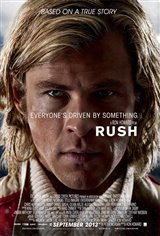The 2013 movie Rush, directed by Ron Howard, is based on the true story of the rivalry between Formula 1 racers James Hunt and Nikki Lauda in the 1970s. It chronicles each man’s journey from their privileged upbringings to their rise to the top as Formula 1 championship competitors and the tragedy each of them experienced.
Hunt was born August 29, 1947, the second child and first son of successful London stockbroker Wallis Hunt and his wife Sue. Growing up, James developed a rebellious, moody and competitive personality that would eventually form his public image as “Hunt the Shunt” during his professional race car driving career. Hunt first discovered his passion for racing at the age of 18 after witnessing his first race at Silverstone. Despite his family being unsupportive, Hunt still pursed his dreams. Under the leadership of aristocrat Alexander Hesketh, Hunt became part of a group known as the Hesketh Racing team. Throughout his career, Hunt became as famous for his extravagance and playboy reputation as his racing records.
During this time period, Hunt’s rival Nikki Lauda was simultaneously forming a name for himself in the world of racing. Although he was born into a wealthy Austrian business family in Vienna on February 22, 1949, Lauda had to earn his own way in pursuit of his dream to be a top race car driver. He worked his way up by using bank loans to support his races. In 1974, he began to work for Enzo Ferrari, who hadn’t had a champion since 1964. It paid off when Lauda became a World Champion for Ferrari, earning Formula 1 victories in countries such as Spain and Holland. In contrast to Hunt’s wild persona, Lauda became known as “The Computer” because of his controlled and careful style.
In 1975, Hunt and Lauda’s path collided at the Dutch Grand Prix. Hunt’s Hesketh may have beaten Lauda’s Ferrari in that race, but by the end of that season Alexander quit, leaving Hunt unemployed. However, Hunt’s troubles didn’t last long, since he was soon chosen to replace Emerson Fittipaldi for McLaren. It was now the 1976 season. Hunt and Lauda were once again pitted in the media as the rivals for the championship title. While it may have seemed that way to the public, Hunt and Lauda actually became close friends behind the scenes and even once lived together.
The 1976 season was also one of tragedy for Lauda, who crashed his car during the German Grand Prix. It burst into flames, leaving Lauda with damaged lungs, broken bones and burns on his head and wrists. Hunt won the race, while Lauda’s injuries forced him into a seemingly early retirement. With Lauda unable to compete, Hunt went on to win five other races and became the new frontrunner. All hope seemed lost for Lauda, but he refused to let his injuries prevent him from achieving his dreams. Six weeks after his nearly fatal car accident, he returned to the driver’s seat.
Hunt and Lauda faced off against each other in Japan in the final race of the 1976 season. Both had dreams of winning the championship title, but only one of them would take it. Due to the rainy weather, the roads became too dangerous for Lauda, so he had no choice but to quit after a few laps. Lauda’s decision angered the public, but Hunt supported him and acknowledged his bravery. Hunt, who had nerves of steel, decided to continue racing and went on to win, becoming the new world champion.
Despite the events of the 1976 season, Lauda joined the Brabham team. He would go on to compete in the 1977 and 1978 seasons, landing in honorable positions. But before the end of the 1978 season had even been completed, Lauda made the surprising decision to retire from Formula 1 racing in order to pursue his new dream of starting an airline. Unfortunately, his airline career was short lived and his first passion drew him back. In 1982, he made a comeback to racing after being offered $5 million to race for McLaren. When he eventually did retire from driving, he went out with a bang by winning the 1985 Grand Prix.
Unfortunately, Hunt did not get the same chance as Lauda to grow old and bask in the success that he had earned. Two seasons after winning his championship title, Hunt decided to officially retire in 1979 to become a racing commentator for BBC television. Married and divorced twice, Hunt was known as a playboy and couldn’t seem to commit to any woman. He also was believed to have slept with more than 5,000 women, sometimes having sex minutes before a race. A smoker, he also regularly enjoyed cocaine and marijuana, which may have played a part in his erratic behavior.
In 1989, he met Helen Dyson, a waitress 18 years his junior and the relationship inspired Hunt to live a more healthy lifestyle, giving up cigarettes and bicycling everywhere. They were together almost four years and Hunt reportedly proposed to Helen the day before he suffered a fatal heart attack at his home in London. He was only 45 years of age and left behind two sons from his second marriage.
In September 2013, Niki Lauda attended the Toronto International Film Festival for the screening of the movie Rush, alongside Daniel Brühl, who portrays him in the film.

